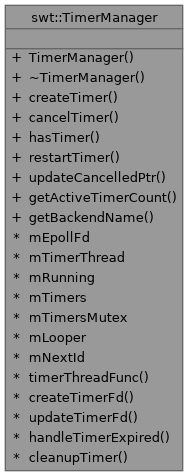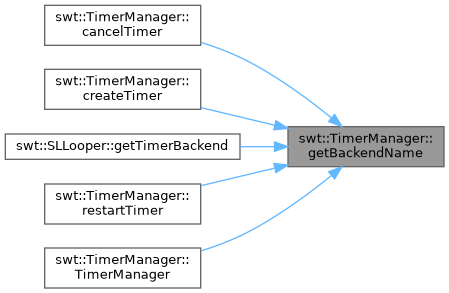High-performance timer management with configurable backend. More...
#include <TimerManager.h>

Classes | |
| struct | TimerInfo |
| Internal timer information structure. More... | |
Public Member Functions | |
| TimerManager (std::weak_ptr< SLLooper > looper) | |
| Construct a new TimerManager. | |
| ~TimerManager () | |
| Destroy the TimerManager and cleanup all resources. | |
| TimerId | createTimer (std::function< void()> callback, uint64_t delay_ms, bool periodic, std::atomic< bool > *cancelled) |
| Create a new timer. | |
| bool | cancelTimer (TimerId id) |
| Cancel an active timer. | |
| bool | hasTimer (TimerId id) |
| Check if a timer exists and is active. | |
| bool | restartTimer (TimerId id, uint64_t delay_ms) |
| Restart an existing timer with new delay. | |
| void | updateCancelledPtr (TimerId id, std::atomic< bool > *newPtr) |
| Update the cancellation flag pointer for an existing timer. | |
| size_t | getActiveTimerCount () |
| Get the number of currently active timers. | |
Static Public Member Functions | |
| static const char * | getBackendName () |
| Get the name of the currently compiled timer backend. | |
Detailed Description
High-performance timer management with configurable backend.
TimerManager provides a unified interface for managing timers with two different backend implementations:
TIMERFD_EPOLL Backend (Linux):
- Uses Linux timerfd + epoll for high performance
- Single dedicated thread processes all timer events
- Excellent scalability for many concurrent timers
- Low CPU overhead and precise timing
SIGEV_THREAD Backend (POSIX):
- Uses POSIX timer_create with SIGEV_THREAD
- Each timer callback runs in its own thread
- Portable across UNIX systems
- Higher resource usage but better compatibility
- Thread Safety
- All public methods are thread-safe and can be called from multiple threads concurrently. Timer callbacks are executed on the SLLooper main thread.
- Performance Characteristics
- TIMERFD_EPOLL: O(1) timer creation/deletion, O(log n) event processing
- SIGEV_THREAD: O(1) timer creation/deletion, O(1) event processing per timer
- Example Usage
- auto looper = std::make_shared<SLLooper>();TimerManager manager(looper);// Create one-shot timerstd::atomic<bool> cancelled(false);TimerId id = manager.createTimer([]() {std::cout << "Timer fired!" << std::endl;}, 1000, false, &cancelled);// Create periodic timerTimerId periodicId = manager.createTimer([]() {std::cout << "Periodic timer!" << std::endl;}, 500, true, nullptr);High-performance timer management with configurable backend.Definition TimerManager.h:137
- Warning
- Timer callbacks must not block for extended periods as they run on the main event loop thread.
Definition at line 137 of file TimerManager.h.
Constructor & Destructor Documentation
◆ TimerManager()
|
explicit |
Construct a new TimerManager.
- Parameters
-
looper Weak reference to parent SLLooper for callback posting
Initializes the timer management system with the compile-time selected backend. For TIMERFD_EPOLL, creates epoll instance and starts timer thread. For SIGEV_THREAD, performs minimal initialization.
- Exceptions
-
std::runtime_error If backend initialization fails (e.g., epoll_create fails)
- Example
- auto looper = std::make_shared<SLLooper>();TimerManager manager(looper); // Automatically uses configured backend
- Warning
- The SLLooper must remain alive for the lifetime of TimerManager
- See also
- ~TimerManager()
Definition at line 17 of file TimerManager.cpp.
References getBackendName(), TIMER_DEBUG, TIMER_DEBUG_STREAM, and TIMER_ERROR_STREAM.

◆ ~TimerManager()
| swt::TimerManager::~TimerManager | ( | ) |
Destroy the TimerManager and cleanup all resources.
Safely shuts down the timer system by:
- Setting running flag to false
- Cancelling all active timers
- Cleaning up backend-specific resources
- Joining timer thread (TIMERFD_EPOLL only)
All timer callbacks in progress will complete before destruction finishes.
- Note
- Destructor is thread-safe and can be called while timers are active
- Cleanup Details
- TIMERFD_EPOLL: Closes all timerfd handles, joins timer thread, closes epoll fd
- SIGEV_THREAD: Deletes all POSIX timers, removes from global map
- See also
- TimerManager()
Definition at line 41 of file TimerManager.cpp.
References TIMER_DEBUG, TIMER_DEBUG_STREAM, and TIMER_INFO.
Member Function Documentation
◆ cancelTimer()
| bool swt::TimerManager::cancelTimer | ( | TimerId | id | ) |
Cancel an active timer.
- Parameters
-
id Timer ID returned by createTimer()
- Returns
- true if timer was found and cancelled successfully
- false if timer ID not found or already cancelled
Immediately stops the specified timer and removes it from the system. If the timer callback is currently executing, this method will wait for it to complete before returning.
After cancellation, the timer ID becomes invalid and should not be used.
- Thread Safety
- This method is thread-safe and can be called from any thread, including from within timer callbacks.
- Backend Behavior
- TIMERFD_EPOLL: Removes from epoll, closes timerfd, removes from map
- SIGEV_THREAD: Calls timer_delete(), removes from global map
- Example
- // Cancel immediatelyif (manager.cancelTimer(id)) {std::cout << "Timer cancelled successfully" << std::endl;}// Attempting to cancel again returns falsebool result = manager.cancelTimer(id); // false
- Note
- Cancelling an invalid ID is safe and returns false
- See also
- createTimer()
- hasTimer()
Definition at line 416 of file TimerManager.cpp.
References getBackendName(), and TIMER_DEBUG_STREAM.

◆ createTimer()
| TimerId swt::TimerManager::createTimer | ( | std::function< void()> | callback, |
| uint64_t | delay_ms, | ||
| bool | periodic, | ||
| std::atomic< bool > * | cancelled | ||
| ) |
Create a new timer.
- Parameters
-
callback Function to call when timer expires (must not be null) delay_ms Delay in milliseconds before first expiration (must be > 0) periodic true for repeating timer, false for one-shot timer cancelled Optional pointer to atomic bool for external cancellation
- Returns
- TimerId Unique timer identifier (0 if creation failed)
Creates and starts a new timer that will call the provided callback after the specified delay. For periodic timers, the callback will be called repeatedly at the specified interval until cancelled.
The callback will be executed on the SLLooper main thread, ensuring thread safety with other event loop operations.
- Cancellation Mechanism
- If a cancelled pointer is provided, the timer will check this flag before executing the callback. This allows for external cancellation even after the timer has fired but before callback execution.
- Backend Behavior
- TIMERFD_EPOLL: Creates timerfd, configures timing, adds to epoll
- SIGEV_THREAD: Creates POSIX timer with SIGEV_THREAD notification
- Error Conditions
- Returns 0 if:
- callback is null
- System timer creation fails (out of resources, invalid parameters)
- Backend-specific errors (epoll_ctl failure, timer_create failure)
- Example
- // One-shot timerTimerId id = manager.createTimer([]() {std::cout << "Timer fired once!" << std::endl;}, 1000, false, nullptr);// Periodic timer with cancellationstd::atomic<bool> cancelled(false);TimerId periodicId = manager.createTimer([&]() {std::cout << "Periodic: " << std::chrono::steady_clock::now() << std::endl;}, 500, true, &cancelled);// Cancel after some timestd::this_thread::sleep_for(std::chrono::seconds(2));cancelled = true;
- Warning
- Callback must not block for extended periods
- Do not capture TimerManager or Timer objects in callback to avoid cycles
- See also
- cancelTimer()
- restartTimer()
Definition at line 77 of file TimerManager.cpp.
References swt::TimerManager::TimerInfo::callback, swt::TimerManager::TimerInfo::cancelled, swt::TimerManager::TimerInfo::fd, getBackendName(), swt::TimerManager::TimerInfo::id, swt::TimerManager::TimerInfo::interval_ms, swt::TimerManager::TimerInfo::periodic, TIMER_DEBUG_STREAM, TIMER_ERROR, and TIMER_ERROR_STREAM.

◆ getActiveTimerCount()
| size_t swt::TimerManager::getActiveTimerCount | ( | ) |
Get the number of currently active timers.
- Returns
- size_t Number of active timers managed by this instance
Returns the current count of active timers. This includes both one-shot and periodic timers that have not yet been cancelled or expired.
- Thread Safety
- This method is thread-safe and returns a consistent snapshot at call time.
- Performance
- This is an O(1) operation that returns the size of the internal timer map.
- Example
- std::cout << "Active timers: " << manager.getActiveTimerCount() << std::endl;// Create some timersauto id1 = manager.createTimer(callback, 1000, false, nullptr);auto id2 = manager.createTimer(callback, 2000, true, nullptr);std::cout << "After creation: " << manager.getActiveTimerCount() << std::endl; // 2manager.cancelTimer(id1);std::cout << "After cancel: " << manager.getActiveTimerCount() << std::endl; // 1
- Note
- Count may change immediately after return due to concurrent operations
- See also
- hasTimer()
- createTimer()
- cancelTimer()
Definition at line 478 of file TimerManager.cpp.
◆ getBackendName()
|
inlinestatic |
Get the name of the currently compiled timer backend.
- Returns
- const char* Backend name string ("TIMERFD_EPOLL" or "SIGEV_THREAD")
Returns a string identifying which timer backend was selected at compile time. This is useful for logging, debugging, and runtime feature detection.
- Return Values
- "TIMERFD_EPOLL" - Linux timerfd + epoll backend
- "SIGEV_THREAD" - POSIX timer_create + sigev_thread backend
- Example
- std::cout << "Timer backend: " << TimerManager::getBackendName() << std::endl;std::cout << "Using high-performance Linux backend" << std::endl;}static const char * getBackendName()Get the name of the currently compiled timer backend.Definition TimerManager.h:536
- Note
- This is a static method and can be called without TimerManager instance
- See also
- SLLooper::getTimerBackend()
Definition at line 536 of file TimerManager.h.
Referenced by cancelTimer(), createTimer(), swt::SLLooper::getTimerBackend(), restartTimer(), and TimerManager().

◆ hasTimer()
| bool swt::TimerManager::hasTimer | ( | TimerId | id | ) |
Check if a timer exists and is active.
- Parameters
-
id Timer ID to check
- Returns
- true if timer exists and is active
- false if timer ID not found, cancelled, or expired (for one-shot)
Queries whether the specified timer ID corresponds to an active timer. This is useful for checking timer status before performing operations.
- Thread Safety
- This method is thread-safe and provides a consistent snapshot of timer state.
- Example
- if (manager.hasTimer(id)) {std::cout << "Timer is still active" << std::endl;manager.cancelTimer(id);}
- Note
- Result may become stale immediately after return due to concurrent operations
Definition at line 442 of file TimerManager.cpp.
References TIMER_DEBUG_STREAM.
◆ restartTimer()
| bool swt::TimerManager::restartTimer | ( | TimerId | id, |
| uint64_t | delay_ms | ||
| ) |
Restart an existing timer with new delay.
- Parameters
-
id Timer ID to restart delay_ms New delay in milliseconds
- Returns
- true if timer was found and restarted successfully
- false if timer ID not found
Resets an existing timer to fire after the new specified delay. The timer becomes a one-shot timer regardless of its original periodic setting. If the timer was cancelled via external flag, the cancellation is reset.
This operation is more efficient than cancelling and creating a new timer as it reuses the existing timer resources.
- Thread Safety
- This method is thread-safe and can be called from any thread.
- Backend Behavior
- TIMERFD_EPOLL: Updates timerfd with new interval using timerfd_settime()
- SIGEV_THREAD: Updates POSIX timer with new interval using timer_settime()
- Example
- // Change to fire in 5 seconds (becomes one-shot)if (manager.restartTimer(id, 5000)) {std::cout << "Timer restarted with 5s delay" << std::endl;}
- Warning
- Restarted timer always becomes one-shot, losing periodic behavior
- See also
- createTimer()
- cancelTimer()
Definition at line 449 of file TimerManager.cpp.
References getBackendName(), and TIMER_DEBUG_STREAM.

◆ updateCancelledPtr()
| void swt::TimerManager::updateCancelledPtr | ( | TimerId | id, |
| std::atomic< bool > * | newPtr | ||
| ) |
Update the cancellation flag pointer for an existing timer.
- Parameters
-
id Timer ID to update newPtr New pointer to atomic bool cancellation flag
Updates the cancellation flag pointer for an existing timer. This allows changing the external cancellation mechanism after timer creation.
The new pointer will be checked before each callback execution. Pass nullptr to disable external cancellation for the timer.
- Thread Safety
- This method is thread-safe. The pointer update is atomic.
- Use Cases
- Changing ownership of cancellation control
- Disabling external cancellation (pass nullptr)
- Updating to new cancellation flag after object moves
- Example
- std::atomic<bool> cancelled1(false);// Change to different cancellation flagstd::atomic<bool> cancelled2(false);manager.updateCancelledPtr(id, &cancelled2);// Disable external cancellationmanager.updateCancelledPtr(id, nullptr);
- Warning
- Ensure the new pointer remains valid for timer lifetime
- Old pointer may still be checked if callback is in progress
- See also
- createTimer()
Definition at line 483 of file TimerManager.cpp.
References TIMER_DEBUG_STREAM.
The documentation for this class was generated from the following files:
- include/TimerManager.h
- src/TimerManager.cpp